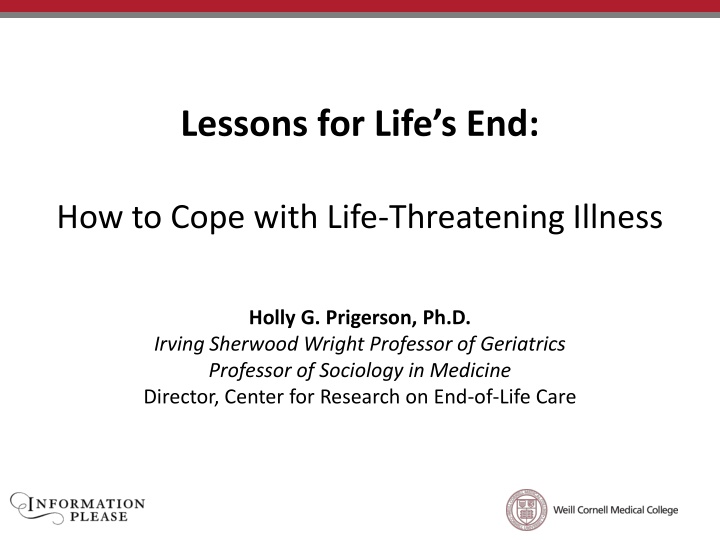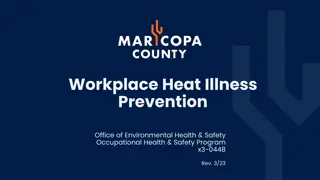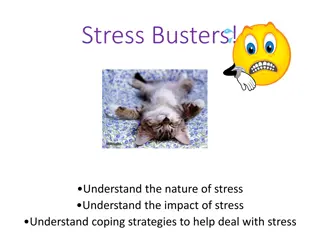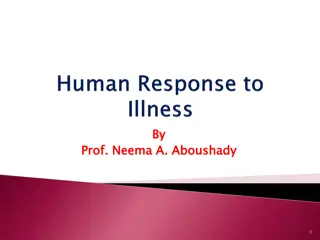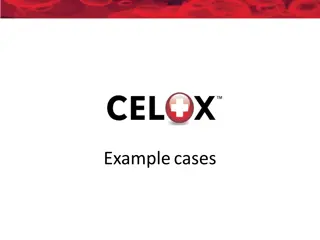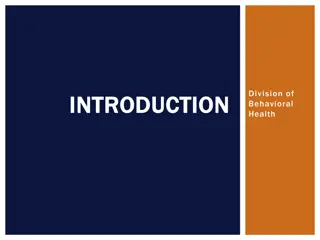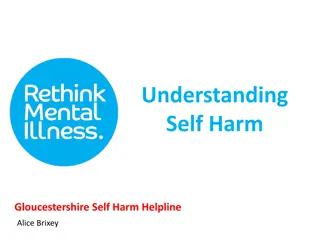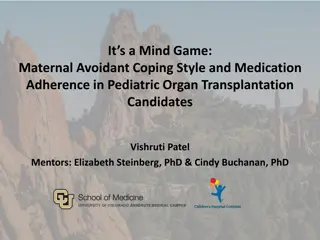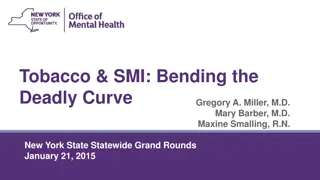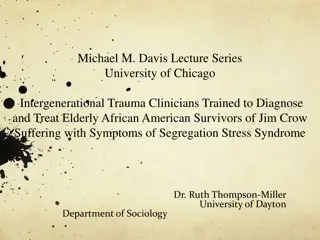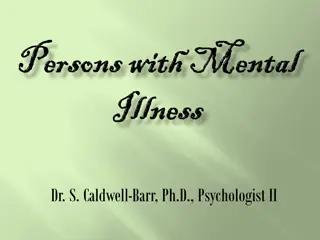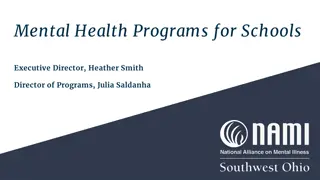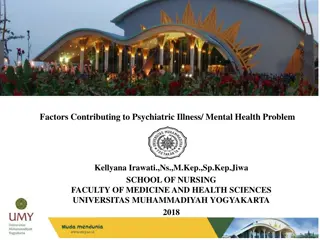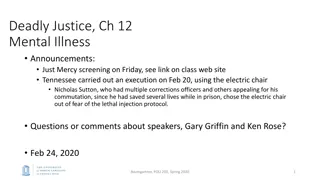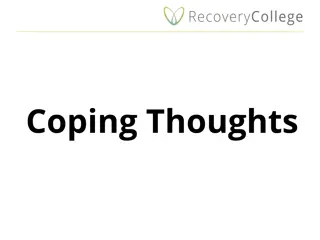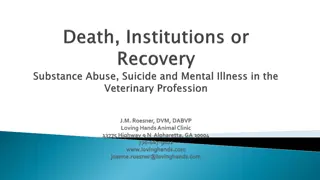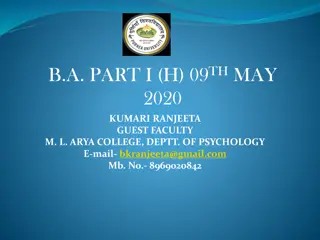Coping with Life-Threatening Illness: Lessons for End-of-Life Challenges
Explore coping strategies for life-threatening illnesses and end-of-life challenges. Dr. Holly G. Prigerson shares insights on breaking myths, understanding life-prolonging care, and the importance of open discussions in facing such difficult topics.
Download Presentation

Please find below an Image/Link to download the presentation.
The content on the website is provided AS IS for your information and personal use only. It may not be sold, licensed, or shared on other websites without obtaining consent from the author.If you encounter any issues during the download, it is possible that the publisher has removed the file from their server.
You are allowed to download the files provided on this website for personal or commercial use, subject to the condition that they are used lawfully. All files are the property of their respective owners.
The content on the website is provided AS IS for your information and personal use only. It may not be sold, licensed, or shared on other websites without obtaining consent from the author.
E N D
Presentation Transcript
TITLE OF PRESENTATION Subtitle of Presentation Lessons for Life s End: How to Cope with Life-Threatening Illness Holly G. Prigerson, Ph.D. Irving Sherwood Wright Professor of Geriatrics Professor of Sociology in Medicine Director, Center for Research on End-of-Life Care
This Is A Tough TopicBUT NOT talking about these things exacerbates the problem Talking is a necessary first step
Coping with Cancer Study Design: A National Institute of Health (NIH)-funded, prospective study of patients with advanced cancer Setting: 8 outpatient cancer clinics in the United States (e.g., Yale, Memorial Sloan-Kettering, University of Texas Southwestern, Dana-Farber) Participants: Adult patients with metastatic cancers who failed at least 1 round of chemotherapy, whom physicians identified as terminally ill at study enrollment, and who subsequently died Assessments: Patients and caregivers assessed 4 months before patient s death; a month after the patient died, caregivers asked about patient s death and medical chart was reviewed
4 Myths About End-of-Life CareBusted! Myth #1: Life-prolonging care: more care is better care; you get what you pay for Myth #2: Talking about death is harmful: doctors who discuss prognosis with patients make them hopeless Myth #3: Psychosocial needs: religious copers die peacefully; therapeutic bonds don t matter with real doctors Myth #4: A good death is an oxymoron: not possible
Myth #1: Myths about Life-Prolonging Care Conventional Wisdom: More care is better care You get what you pay for
How Can More Be Less? Human nature to want more of a good thing If medical care is good, more must be better But, aggressive end-of-life care includes: intubation (breathing tube) resuscitation (chest compression, shock) feeding tubes palliative chemotherapy
Patients & Families Often Dont Know What Life-Prolonging Care Actually Entails Example: INTUBATION Many are not aware that when people are intubated (i.e., have a tube connected to a machine to breathe) they: can t talk can t eat with their mouth are usually sedated (unconscious)
Example: PALLIATIVE CHEMOTHERAPY Patients think: chemo will cure me ; palliative means I should feel better BUT, palliative chemo results in worse quality of life no actual palliation no survival benefit higher odds of dying in intensive care unit (ICU) lower odds of dying at home lower odds of dying where family thought you wanted to die
Data Show End-of-Life Care Is Overly Aggressive & Becoming More So In 2008, >50% of incurable cancer patients were getting palliative chemo 4 months from death; in 2014, 81% Across United States Intensive Care Unit (ICU) stays in last month of life are common (~30%) ; the trend is increasing Hospice referrals within days of death are common (45%) too late to offer much help Bankrupting of our health care system 25% of Medicare costs spent on last year of life 40% of that is for care in last month of life
Cant Buy a Better Death: The High Cost of Interventions Increased cost of late-term interventions directly related to Lower quality of death
Myth #2: Conflicting Beliefs Re: Talking About Death with Doctors Conventional Wisdom: Patients base their prognostic understanding on what their doctors tell them BUT, doctors shouldn t discuss death with patients because this will make them needlessly hopeless
So Where Do Patients Get Their Information About Their Prognosis?
Many Patients Dont Think Theyre Dying & Don t Understand Treatments 63% patients 4 months before death are unaware they re dying 80% of incurable patients receiving chemotherapy believe that chemotherapy is being administered to cure them 72% patients say they would want their doctor to discuss their prognosis with them if they knew it But only 17% report being told
Why Dont Doctors Have End-of-Life Discussions? not taught how fear it may make patients hopeless believe it doesn t change outcomes
Our Data Suggest Otherwise! End-of-life discussions do not make patients more hopeless; on the contrary, they re associated with: Greater acceptance of terminal illness More realistic life-expectancy estimates Preferences for comfort care over life-extension at any cost More frequent completion of do-not-resuscitate orders Less non-curative, burdensome aggressive care Lower costs to the healthcare system
Myth #3: Attending To Psychosocial Needs Conventional Wisdom: Religious patients die more peacefully Therapeutic bonds only matter with therapists not with real doctors
Religious Coping Religious copers people who seek God s love & support to cope with illness Religious copers 3 times more likely to be on ventilator or resuscitated in their last week of life vs. non-religious copers (11% vs. 4%)
Spiritual Support From Medical Community To what extent are your religious/spiritualneeds being supportedby the medical system (e.g.,doctors, nurses, hospital chaplain)? Responses: Not at all T o a small extent T o a moderate extent T o a large extent Completely supported Low Support High Support
ICU Admissions/Deaths In The Last Week Of Life By SpiritualCare From The Health Care Team Adjusted Rates ofICU stay in last week T otalSample (n = 303) Racial/ethnic Minorities (n = 118) High Religious CopingPatients (n = 159)
Therapeutic Alliance Based on Mutual Trust, Empathy and Shared Goals of Care Of all the possible alliances a patient can develop, such as an alliance with: Other oncology clinic staff Oncology social workers Mental health professionals Clergy members Palliative care physicians A patient s relationship with his/her oncologist is the most important relationship in terms of coping with his/her fate Patients are four times less likely to consider suicide if they report a strong bond with their oncologist
Myth #4: A Good Death is An Oxymoron Conventional Wisdom: Nothing can be done to improve how we die
What Can Patients, Family Members, & Clinicians Do for Patients To Die Better? Lessons from the Coping With Cancer Study
How to Improve End-Of-Life Care 1. Patients/families should ask doctors about prognosis, curability 2. Clinicians should be encouraged to: discuss prognosis, curability explain risks of aggressive care; benefits of palliative care discuss end-of-life goals of care complete advance directive (e.g., Do Not Resuscitate order)
How to Improve End-Of-Life Care (contd) 3. Patients/family may need help accepting prognosis & understanding treatment options 4. Clinicians should confirm comprehension so patients can work with them to make informed choices & live remaining days consistent with patient goals & values
"Take-Home Messages 1. At end-of-life, more aggressive, expensive care is often worse care 2. Patients, families & doctors need to have honest discussions about prognosis & treatment options 3. Religious beliefs and therapeutic bonds powerfully influence care and need to be addressed 4. A good death is achievable with informed decision- making & attention to psychosocial issues
This Is A Tough TopicBUT NOT talking about these things exacerbates the problem Talking is a necessary first step Thank you for listening! Holly G. Prigerson, Ph.D. Director, Center for Research on End of Life Care hgp2001@med.cornell.edu
